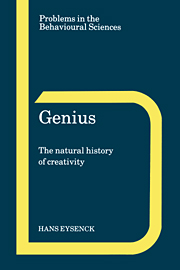Crossref Citations
This Book has been
cited by the following publications. This list is generated based on data provided by Crossref.
Eysenck, Hans J.
1995.
How valid is the psychoticism scale? A comment on the Van Kampen critique.
European Journal of Personality,
Vol. 9,
Issue. 2,
p.
103.
Freeman, Joan
1995.
CONFLICTS IN CREATIVITY.
European Journal of High Ability,
Vol. 6,
Issue. 2,
p.
188.
Feltham, Colin
1996.
Psychotherapy's staunchest critic: An interview with Hans Eysenck.
British Journal of Guidance & Counselling,
Vol. 24,
Issue. 3,
p.
423.
Eysenck, Hans J.
1996.
Personality and the experimental study of education.
European Journal of Personality,
Vol. 10,
Issue. 5,
p.
427.
Brand, C. R.
1996.
The importance of intelligence in Western societies.
Journal of Biosocial Science,
Vol. 28,
Issue. 4,
p.
386.
Feltham, Colin
1996.
Psychotherapy's staunchest critic: an interview with Hans Eysenck.
British Journal of Guidance and Counselling,
Vol. 24,
Issue. 3,
p.
423.
Hartley, James
and
Greggs, Michael A.
1997.
Divergent thinking in arts and science students:Contrary imaginationsat Keele revisited.
Studies in Higher Education,
Vol. 22,
Issue. 1,
p.
93.
Freeman, Joan
1997.
The emotional development of the highly able.
European Journal of Psychology of Education,
Vol. 12,
Issue. 4,
p.
479.
Andersson, Gerhard
and
Lundh, Lars-Gunnar
1997.
Editorial: Hans Eysenck in memorial.
Scandinavian Journal of Behaviour Therapy,
Vol. 26,
Issue. 4,
p.
145.
Eysenck, H. J.
1997.
Biosocial Bases of Violence.
p.
21.
Ackerman, Phillip L.
1997.
Personality, Self‐Concept, Interests, and Intelligence: Which Construct Doesn't Fit?.
Journal of Personality,
Vol. 65,
Issue. 2,
p.
171.
SIMONTON, DEAN KEITH
1998.
Donald Campbell's Model of the Creative Process: Creativity as Blind Variation and Selective Retention.
The Journal of Creative Behavior,
Vol. 32,
Issue. 3,
p.
153.
Dewey, Alison
Steinberg, Hannah
and
Coulson, Mark
1998.
Conditions in Which British Artists Achieve Their Best Work.
Creativity Research Journal,
Vol. 11,
Issue. 4,
p.
275.
CZIKO, GARY A.
1998.
From Blind to Creative: In Defense of Donald Campbell's Selectionist Theory of Human Creativity.
The Journal of Creative Behavior,
Vol. 32,
Issue. 3,
p.
192.
Kay, S.
Rogers, K.
Albert, Robert S.
Csikszentmihalyi, Mihaly
Davis, Gary A.
Feldman, David Henry
Benjamin, Ann C.
Parnes, Sidney J.
Puccio, Gerard J.
Simonton, Dean Keith
Sternberg, Robert J.
and
Torrance, E. Paul
1998.
Letters from the field.
Roeper Review,
Vol. 21,
Issue. 1,
p.
78.
Chorney, M.J.
Chorney, K.
Seese, N.
Owen, M.J.
Daniels, J.
McGuffin, P.
Thompson, L.A.
Detterman, D.K.
Benbow, C.
Lubinski, D.
Eley, T.
and
Plomin, R.
1998.
A Quantitative Trait Locus Associated With Cognitive Ability in Children.
Psychological Science,
Vol. 9,
Issue. 3,
p.
159.
Radford, John
1998.
Prodigies in the Press.
High Ability Studies,
Vol. 9,
Issue. 2,
p.
153.
Feist, Gregory J.
and
Gorman, Michael E.
1998.
The Psychology of Science: Review and Integration of a Nascent Discipline.
Review of General Psychology,
Vol. 2,
Issue. 1,
p.
3.
Ericsson, K. Anders
1998.
The Scientific Study of Expert Levels of Performance: general implications for optimal learning and creativity1.
High Ability Studies,
Vol. 9,
Issue. 1,
p.
75.
Feist, Gregory J.
1998.
A Meta-Analysis of Personality in Scientific and Artistic Creativity.
Personality and Social Psychology Review,
Vol. 2,
Issue. 4,
p.
290.



